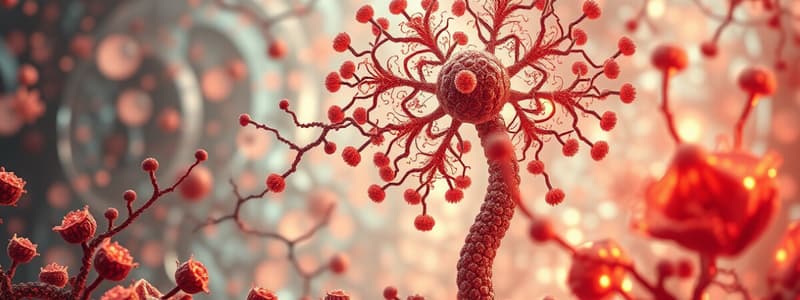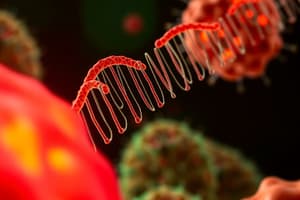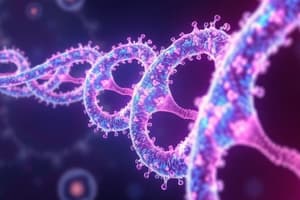Podcast
Questions and Answers
Which molecule is activated by PIP3 in the Pisk pathway?
Which molecule is activated by PIP3 in the Pisk pathway?
- Raf
- Erk
- Akt (PKB) (correct)
- MEK
Mutated Ras can complicate treatment options for cancer patients.
Mutated Ras can complicate treatment options for cancer patients.
True (A)
Name one drug that works on the Pisk pathway.
Name one drug that works on the Pisk pathway.
Idelalisib
The protein ___ is activated by the Apoptosome to initiate controlled cell death.
The protein ___ is activated by the Apoptosome to initiate controlled cell death.
Match the following terms with their corresponding pathways:
Match the following terms with their corresponding pathways:
What is the main role of Akt in the Pisk pathway?
What is the main role of Akt in the Pisk pathway?
The extrinsic pathway of apoptosis is initiated by internal stimuli.
The extrinsic pathway of apoptosis is initiated by internal stimuli.
What leads to the activation of caspase-3 and caspase-7 in the intrinsic pathway?
What leads to the activation of caspase-3 and caspase-7 in the intrinsic pathway?
What is the role of activated caspase-8 in the apoptosis process?
What is the role of activated caspase-8 in the apoptosis process?
Caspase-3 is responsible for initiating the apoptotic process.
Caspase-3 is responsible for initiating the apoptotic process.
What type of therapy involves modifying a patient's T-cells to attack cancer cells?
What type of therapy involves modifying a patient's T-cells to attack cancer cells?
The binding of PD-L1 on tumor cells sends a __________ signal to T-cells, preventing them from attacking the tumor.
The binding of PD-L1 on tumor cells sends a __________ signal to T-cells, preventing them from attacking the tumor.
Match the immunotherapy types with their descriptions:
Match the immunotherapy types with their descriptions:
Which of the following is NOT a side effect of immunotherapy?
Which of the following is NOT a side effect of immunotherapy?
Immunotherapy can only target solid tumors, not blood cancers.
Immunotherapy can only target solid tumors, not blood cancers.
What are the two main checkpoint proteins inhibited by therapeutic drugs in immunotherapy?
What are the two main checkpoint proteins inhibited by therapeutic drugs in immunotherapy?
What is the primary function of the PD-1 receptor when it binds to PD-L1?
What is the primary function of the PD-1 receptor when it binds to PD-L1?
Monoclonal antibodies can enhance the body's ability to destroy normal cells.
Monoclonal antibodies can enhance the body's ability to destroy normal cells.
What is the main advantage of using bispecific antibodies in cancer treatment?
What is the main advantage of using bispecific antibodies in cancer treatment?
PD-1 receptor interaction with PD-L1 helps prevent __________________ by regulating T-cell activity.
PD-1 receptor interaction with PD-L1 helps prevent __________________ by regulating T-cell activity.
Which of the following describes how monoclonal antibodies work?
Which of the following describes how monoclonal antibodies work?
Epigenetic changes do not alter the DNA sequence but can still affect gene expression.
Epigenetic changes do not alter the DNA sequence but can still affect gene expression.
Match the following types of antibodies with their characteristics:
Match the following types of antibodies with their characteristics:
DNA methylation is a process in which __________ groups are added to DNA, often leading to gene silencing.
DNA methylation is a process in which __________ groups are added to DNA, often leading to gene silencing.
Flashcards are hidden until you start studying
Study Notes
Signaling Pathways
- PI3K Pathway: Initiated when a growth factor binds to a tyrosine kinase receptor (RTK) on the cell surface. This triggers a cascade of events involving PI3K, PIP2, PIP3, Akt, BAD, mTOR, GSK-3B, and Foxo, leading to cell growth, proliferation, and survival.
- Drugs that target PI3K pathway: Idelalisib, Copanlisib, Duvelisib
- Ras Pathway: Activated when a growth factor binds to an RTK on the cell surface, causing receptor dimerization and autophosphorylation. The active Ras protein activates Raf, MEK, and ERK, ultimately leading to gene transcription for cell cycle progression, differentiation, survival, and growth.
- Drugs that target Raf pathway: Vemurafenib, Trametinib, Dabrafenib, Sorafenib
- Mutations in Ras and Raf are common in cancers: These mutations can lead to uncontrolled cell proliferation.
- Mutated Ras: Makes cancer cells resistant to drugs targeting this pathway.
Apoptosis
- Intrinsic Pathway: Triggered by internal stimuli signaling unfavorable conditions for survival. Pro-apoptotic members of the Bcl-2 family (BAX and BAK) activate, leading to mitochondrial permeabilization and release of cytochrome c and apoptotic factors into the cytoplasm. Cytochrome c and Apaf-1 form the apoptosome, which activates caspase-9, leading to caspase cascade activation and controlled cell death.
- Extrinsic Pathway: Induced by extracellular death ligands binding to death receptors on the cell surface. This triggers receptor trimerization, assembly of the DISC complex, and activation of caspase-8, which activates caspase-3 and leads to apoptosis.
Immunotherapy
- Checkpoint Inhibitors: Block checkpoint proteins on T-cells, allowing immune cells to recognize and kill cancer cells.
- CTLA-4 inhibitors: Block CTLA-4 on T-cells, enhancing their activity. Example: Ipilimumab.
- PD-1/PD-L1 inhibitors: Block PD-1/PD-L1 pathway interaction, preventing cancer cells from inactivating T-cells. Examples: Pembrolizumab, Nivolumab.
- CAR T-cell Therapy: Patients' T-cells are engineered to target specific proteins on cancer cells, enhancing their anti-cancer activity. Often used for blood cancers like leukemia and lymphoma.
- Cancer Vaccines: Stimulate the immune system to attack cancer cells. Examples include HPV vaccines, which prevent cancer related to certain viral infections.
Mechanism of Action of Immunotherapy
- Enhancement of T-cell activity by blocking "off switches" on T-cells (PD-1/PD-L1, CTLA-4).
- Providing specific tools to fight certain cancers by engineering T-cells to target cancer cells (CAR T-cell therapy).
- Stimulating the immune system to fight cancer cells (cancer vaccines).
Side Effects of Immunotherapy
- Autoimmune disease, fatigue, fever, flu-like symptoms, and organ inflammation.
PD-1/PD-L1 Pathway
- In cancer: PD-L1 binding to PD-1 on T-cells inhibits their activity, allowing cancer cells to evade immune detection and destruction.
- Under normal conditions: PD-1/PD-L1 interaction helps regulate T-cell activity, preventing autoimmunity.
- Monoclonal antibodies: Disrupt PD-1/PD-L1 interaction, reactivating T-cells to recognize and destroy cancer cells.
Monoclonal Antibodies (mAbs)
- How they work: Target specific antigens on cancer cells, attracting immune cells to kill cancer cells, blocking signals promoting cancer cell growth, and delivering treatments directly to cancer cells.
- Advantages: Targeted treatment, fewer side effects, compatible with other treatments.
Bispecific Antibodies
- How they work: Bind simultaneously to two different antigens, targeting tumor cells and immune cells, and stimulating immune response against cancer cells. Some bispecific antibodies block signaling pathways that promote cancer growth.
- Advantages: Dual-targeting, increased effectiveness, greater control over immune response.
Epigenetics
- Epigenetic changes: Modifications in gene expression without altering the DNA sequence.
- Main mechanisms: DNA methylation, histone modifications, and non-coding RNAs.
- DNA methylation: Addition of methyl groups to DNA, often silencing genes.
Studying That Suits You
Use AI to generate personalized quizzes and flashcards to suit your learning preferences.




